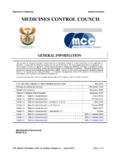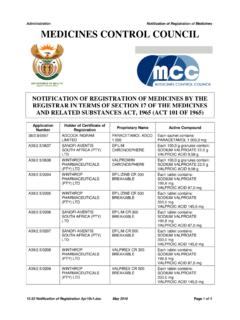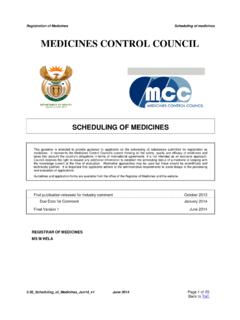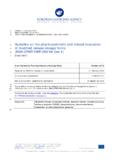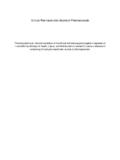Transcription of MEDICINES CONTROL COUNCIL - mccza.com
1 Registration of MEDICINES Biosimilars MEDICINES CONTROL COUNCIL BIOSIMILAR MEDICINES QUALITY, NON- clinical AND clinical REQUIREMENTS This guideline is intended to provide recommendations to applicants wishing to submit applications for the registration of biosimilar MEDICINES . It represents the MEDICINES CONTROL COUNCIL s current thinking on the safety, quality and efficacy of MEDICINES . It is not intended as an exclusive approach. COUNCIL reserves the right to request any additional information to establish the safety, quality and efficacy of a medicine in keeping with the knowledge current at the time of evaluation. Alternative approaches may be used but these should be scientifically and technically justified.
2 The COUNCIL is committed to ensure that all registered MEDICINES will be of the required quality, safety and efficacy. It is important that applicants adhere to all the administrative requirements to avoid delays in the processing and evaluation of applications. Guidelines and application forms are available from the office of the Registrar of MEDICINES and on the MCC website. Version 1: First publication released for comment January 2010 Published for comment April 2010 Deadline for comment 15 July 2010 Version 2: Finalised version for Implementation March 2012 Version 3: Published for comment November 2013 Deadline for comment (extended to 31 March 2014) 31 January 2014 MS M HELA REGISTRAR OF MEDICINES Aug 2014 Page 1 of 20 Registration of MEDICINES Biosimilars TABLE OF CONTENTS Page No 1 PREAMBLE 3 2 SCOPE 3 3 INTRODUCTION 3 4 LEGAL BASIS 4 5 QUALITY and NON- clinical , and clinical DATA 4 QUALITY AND NON- clinical DATA 4 1 Pharmaceutical Quality 5 2 In vitro biostudies 6 Non- clinical (animal) studies 6 clinical DATA 7 1 Pharmacokinetic (PK) studies 8 2 Pharmacodynamic (PD)
3 Studies 8 3 Confirmatory PK/PD studies 8 Efficacy trials 9 5 clinical safety and pharmacovigilance requirements 9 Immunogenicity 10 Principles 10 Evaluation of the clinical significance of the observed response 11 Risk management plan 11 Interchangeability 11 6 GLOSSARY OF TERMS 12 7 REFERENCES 14 8 UPDATE HISTORY 15 ANNEXURE 1: Product Specific for Monoclonal Antibodies 16 Aug 2014 Page 2 of 20 Back to ToC Registration of MEDICINES Biosimilars 1 PREAMBLE Biological MEDICINES that are manufactured to be similar to registered originator MEDICINES (unlike generic pharmaceutical MEDICINES which are identical) are known as Biosimilar. The MCC practices for registration of multisource generic pharmaceutical MEDICINES do not apply to biological MEDICINES .
4 This guideline outlines the specific information required for registration of biosimilar MEDICINES . These types of biological MEDICINES are similar to a reference product already registered in South Africa. 2 SCOPE This guideline is applicable to biological MEDICINES containing well-characterized recombinant DNA-derived therapeutic proteins that can be shown to be similar to a biological medicine registered in South Africa. Vaccines, even if manufactured by recombinant DNA technology are excluded from the scope of this document. (Whereas requirements for monoclonal antibody are outlined in Annexure 1) This guideline also does not address the comparability exercise required for changes introduced in the manufacturing process of a registered product, that is, changes during development and post-registration.
5 These issues are covered in the current MCC Amendments guideline. An application for a biosimilar medicine that uses as reference a registered medicine classified as a pharmaceutical by the MCC, is not exempt from this guideline and should be submitted as described herein. The COUNCIL may decide to waive some or all of the requirements based on the circumstances and nature of the product comparability exercise. This guideline should be read in conjunction with all relevant current guidelines pertaining to medicinal products. See website 3 INTRODUCTION It is the policy of the MCC that all MEDICINES containing, or derived from living materials including biosimilar MEDICINES , are regarded as Biological MEDICINES and that applications for registration will require primary evaluation by the Biological MEDICINES Committee, in addition to other committees of the MCC.
6 If the new product is claimed to be similar in terms of quality, safety and efficacy to a reference medicine that has been registered in South Africa the applicant may submit an application for registration of a biosimilar medicine according to this guideline. The information requirements for a biosimilar application primarily include defined requirements for physico-chemical and biological comparability, and reduced non- clinical and clinical evidence for safety and efficacy as outlined in this guideline. The original registered reference medicine is manufactured and controlled according to non-public proprietary methods that are not available to a follow-on developer; therefore it is necessary that the applicant for a biosimilar medicine (that may use alternative production technologies) provide evidence that the biosimilar is indeed similar in quality, safety and efficacy to the registered medicine used as reference product.
7 If similarity cannot be demonstrated the products cannot be considered to be biosimilar and a full clinical submission application is required. Aug 2014 Page 3 of 20 Back to ToC Registration of MEDICINES Biosimilars 3 Introduction continued An appropriate comparability exercise is required to demonstrate that the biosimilar and the reference medicinal products have similar profiles in terms of physico-chemical properties, quality, safety and efficacy. This guideline outlines the quality, non- clinical and clinical requirements for biosimilar MEDICINES . The quality section addresses the physico-chemical structural and functional requirements. The non- clinical section addresses the pharmaco-toxicological assessments.
8 The clinical section addresses the requirements for pharmacokinetic, pharmacodynamic, safety and efficacy studies as well as the pharmacotoxicological assessments with special emphasis on studying the immunogenicity of the biosimilar MEDICINES . The section on pharmacovigilance addresses the in-use safety of the medicine as well as the risk management plan. Product class specific annexes will supplement this guideline where a need is identified 4 LEGAL BASIS MEDICINES and Related Substances Act, 1965 (Act 101 of 1965), as amended and the relevant Regulations. 5 QUALITY and NON- clinical , and clinical DATA QUALITY AND NON- clinical DATA The objective is to establish the chemical and molecular nature of the biosimilar active pharmaceutical ingredient (API) and drug product, and to show that it has no relevant differences in physico-chemical characteristics when compared to the API in drug product of the reference medicine .
9 The relevance of observed differences in the physico-chemical characteristics must be explored using appropriate functional bio-assays, animal and clinical studies. Validated analytical techniques that show the comparable functionality of the biosimilar and the reference medicine in appropriate in vivo and in vitro systems should be used. The functions that are selected for analysis should be shown to relate to the biological activity of the molecule. All functions should be compared to the reference product activity and should be equivalent in those that are thought to be (major or minor) mechanisms of action, and no new activity is demonstrated that is not evident in the reference product.
10 In vivo animal studies that show comparable toxicology and biological activity should be presented. Non- clinical studies should be performed before initiating clinical development, and should be comparative in nature, designed to detect differences in response between the biosimilar and the reference medicine and not just the response per se. The design of an appropriate non- clinical study program requires a clear understanding of the product characteristics. Results from the physicochemical and biological characterisation studies should be reviewed to assess the potential impact on efficacy and safety. A holistic approach is necessary to include all available information in the development of the non- clinical and clinical studies leading to a successful application for registration.


